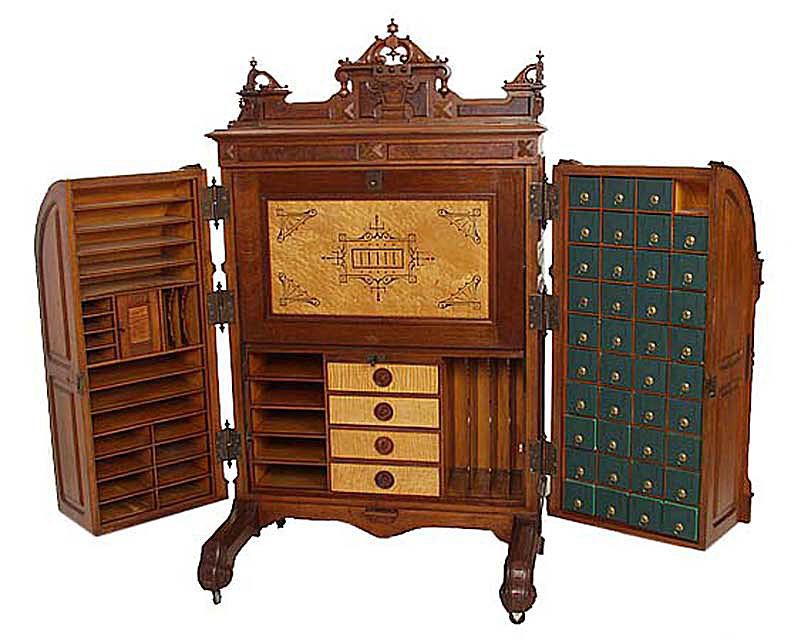The Wooton desk, also known as the Wooton Patent Desk or Wooton Cabinet Office Secretary, is a type of antique desk that became highly popular in the late 19th century. Here are some key facts and interesting details about the Wooton desk:
- Inventor and Manufacturer: The Wooton desk was invented by William S. Wooton, who founded the Wooton Desk Company in Indianapolis, Indiana, in 1870. The company quickly gained a reputation for producing high-quality, innovative office furniture.
- Design and Features: The Wooton desk is known for its elaborate design and exceptional storage capacity. It typically features a large central writing surface with numerous compartments, drawers, and pigeonholes arranged in a highly organized manner. The desk is enclosed by large doors that can be locked, providing both security and protection for the contents.
- Versatility and Customization: Wooton desks were often custom-made to suit the needs of individual clients. They were available in various sizes and configurations, with options for additional features such as letter holders, file drawers, and secret compartments. The desks were also highly versatile, serving as both writing desks and filing cabinets.
- Materials and Craftsmanship: Wooton desks were crafted from high-quality materials, including solid woods such as oak, walnut, and mahogany. The craftsmanship was exceptional, with intricate carvings, inlays, and decorative hardware often adorning the desks.
- Popularity and Clients: The Wooton desk became a symbol of status and success during the Gilded Age. It was favored by prominent businessmen, bankers, lawyers, and other professionals who needed to manage large volumes of paperwork. Notable clients included John D. Rockefeller and Joseph Pulitzer.
- Marketing and Innovations: William Wooton was a savvy marketer who promoted his desks as the ultimate solution for office organization and efficiency. He secured patents for various innovative features, including the unique door mechanism and the highly functional interior layout.
- Decline and Rarity: The popularity of the Wooton desk declined in the early 20th century as office furniture design evolved and the demand for such elaborate desks decreased. Today, original Wooton desks are considered rare and highly collectible antiques, often fetching high prices at auctions.
- Types of Wooton Desks: There were several types of Wooton desks, including the Standard Grade, Extra Grade, Superior Grade, and the more elaborate and expensive Premium Grade. Each type offered different levels of ornamentation and complexity in design.
- Cultural Impact: The Wooton desk has appeared in various cultural contexts, including literature and film, often symbolizing wealth, power, and meticulous organization. It remains an iconic piece of Victorian-era furniture.
- Modern Appreciation: Antique collectors and enthusiasts highly value Wooton desks for their historical significance, craftsmanship, and unique design. Restored Wooton desks can be found in museums, historical societies, and private collections.
The Wooton desk stands as a testament to the ingenuity and craftsmanship of the late 19th century, reflecting the period’s emphasis on order, productivity, and elegance in office environments.
